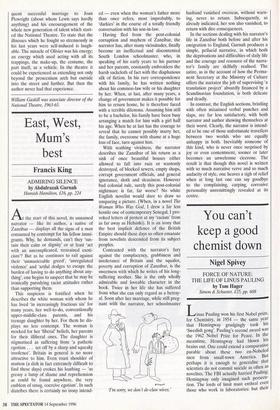East, West, Mum's best Francis King
ADMIRING SILENCE by Abdulrazak Gurnah
Hamish Hamilton, £16, pp. 224
Athe start of this novel, its unnamed narrator — like its author, a native of Zanzibar — displays all the signs of a man consumed by contempt for his fellow immi- grants. Why, he demands, can't they 'sus- tain their calm or dignity' or at least 'act with an uncomplicated, restrained exoti- cism'? But as he continues to rail against their 'unmasterable greed', 'unregulated violence' and 'artful dodges to escape the burden of having to do anything about any- thing', one begins to suspect that he may be ironically parodying racist attitudes rather than supporting them.
This suspicion is fortified when he describes the white woman with whom he has lived 'in increasingly fractious sin' for many years, her well-to-do, conventionally upper-middle-class parents, and his teenage daughter by her. For them he dis- plays no less contempt. The woman is mocked for her 'liberal' beliefs, her parents for their illiberal ones. The daughter is stigmatised as suffering from 'a pathetic egotism ... set off by a sharp and squeaky insolence'. Britain in general is no more attractive to him. Even roast shoulder of mutton (a dish in fact extremely difficult to find these days) evokes his loathing — 'as greasy a lump of shame and reprehension as could be found anywhere, the very emblem of smug, coercive egotism'. In such diatribes there is certainly no irony intend-
ed — even when the woman's father more than once refers, most improbably, to 'darkies' in the course of a totally friendly conversation with his son-in-law.
Having fled from the post-colonial corruption and mayhem of Zanzibar, the narrator has, after many vicissitudes, finally become an ineffectual and discontented South London schoolmaster, who, in speaking of his early years to his partner and her parents, constantly embroiders the harsh sackcloth of fact with the diaphanous silk of fiction. In his rare correspondence with his family, he has written nothing about his common-law wife or his daughter by her. When, at last, after many years, a change of government makes it possible for him to return home, he is therefore faced with a terrible dilemma. Assuming him still to be a bachelor, his family have been busy arranging a match for him with a girl half his age. When he at last has the courage to reveal that he cannot possibly marry her, the family, overcome with shame at a huge loss of face, turn against him.
With scathing vividness, the narrator describes the Zanzibar of his return as a sink of once beautiful houses either allowed to fall into ruin or wantonly destroyed, of blocked sewers, empty shops, corrupt government officials, and general ignorance, sloth and sleaziness. However bad colonial rule, surely this post-colonial nightmare is far, far worse? No white English novelist would dare to draw so unsparing a picture. (When, in a novel The Woman Who Was God, I drew a far less hostile one of contemporary Senegal, I pro- voked letters of protest at my 'racism' from as far away as Helsinki). It is an irony that the best implicit defence of the British Empire should these days so often emanate from novelists descended from its subject peoples.
Contrasted with the narrator's fury against the complacency, grubbiness and intolerance of Britain and the squalor, poverty and corruption of Zanzibar, is the sweetness with which he writes of his long- suffering mother. She is the only wholly admirable and loveable character in the book. Twice in her life she has suffered from what she can only regard as a betray- al. Soon after her marriage, while still preg- nant with the narrator, her schoolmaster 'I'm sorry, we don't de-claw wives.' husband vanished overseas, without warn- ing, never to return. Subsequently, as already indicated, her son also vanished, to return with dire consequences.
In the sections dealing with his narrator's life in Zanzibar both before and after his emigration to England, Gurnah produces a simple, pellucid narrative, in which both the deprivations and difficulties of daily life and the courage and resource of the narra- tor's family are skilfully realised. The satire, as in the account of how the Perma- nent Secretary at the Ministry of Culture offers the narrator the job of supervising 'a translation project' absurdly financed by a Scandinavian foundation, is both delicate and deadly.
In contrast, the English sections, bristling with often misaimed verbal punches and slaps, are far less satisfactory, with both narrator and author showing themselves at their worst. Clearly, the narrator is intend- ed to be one of those unfortunate travellers between two worlds who are equally unhappy in both. Inevitably someone of this kind, who is never once surprised by joy or even contentment, sooner or later becomes an unwelcome cicerone. The result is that though this novel is written with so much narrative verve and so much audacity of style, one heaves a sigh of relief when at long last one can say goodbye to the complaining, carping, corrosive personality unremittingly revealed at its centre.


































































 Previous page
Previous page